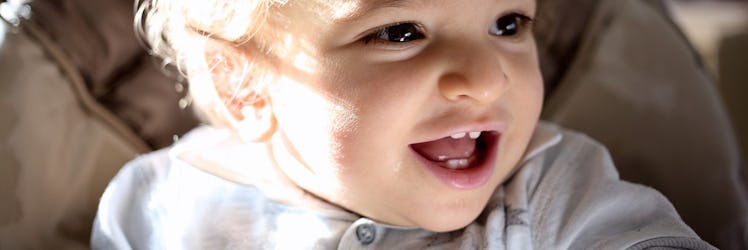Is It Babbling Or Talking? How To Tell If Your Baby Is Trying To Speak
Sciences knows a whole lot about this nonsense.

The rhythmic strings of consonant-vowel-consonant-vowel sounds like “bababa” and “dadada” aren’t just ideal first words for your kid. They’re now understood as the building blocks of language, the “canonical” babble from which the very word is derived (sorry, legendary biblical tower). So, is your kid babbling or trying to speak? Yes.
Because you’re extremely well-read, you already know that language development begins almost immediately; your kid is starting to process what you say long before they have any clue they just shat themselves. What you may not realize is that both the gooey, gurgly noises your kid makes in the first 6 months and the more traditional babble that follows represent them figuring out how to differentiate between sounds and trying to practice them. Essentially, whether it sounds random or like a never-ending request for a bottle from dad, your kid is trying to talk. The major difference is that once they start making those consonant sounds, they’re actively practicing — maneuvering their mouth and tongue, listening to the results, and differentiating between them.
However, you should still treat all sounds as words, not just the syllables that seem recognizable to you, because current research also suggests that the moments when they’re babbling are when babies are most focused, attentive, and primed to learn word formation. So when your kid sees an orange, does that adorable furrowed brow thing, and then says, “Ba, ba, ba,” tell them it’s an orange instead of asking if they want their bottle for the nineteenth time. Incidentally, you have to do this if you want them to be able to start truly forming those different syllables and words by around 12 months, which is generally considered “normal.” TV and educational videos don’t provide the quality or context for learning that real-life adult response does. There’s even a handy tracker to make sure you’re giving them enough word-juice in the key early years.
All of which is to suggest that the most useless response to baby babble just might be, “Use your words.” They’re trying to, man.
This article was originally published on